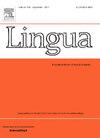Sentence processing in Turkish: A review and future directions
IF 1.3
3区 文学
0 LANGUAGE & LINGUISTICS
引用次数: 0
Abstract
This paper reviews sentence processing research conducted on Turkish and offers insights into future projects that can examine some further questions that take advantage of the typological properties of Turkish. Sentence processing research has focused mainly on processing ambiguous constructions and linguistic dependencies, and sentence processing research in Turkish has followed a similar path. The findings of the reviewed work on Turkish support the primacy of syntax views in sentence processing, since non-syntactic factors were found to be either delayed or observed in sentence-final decisions. The results of the review have also indicated that, despite Turkish being a head-final language, most sentence processing research on Turkish (on both ambiguity and dependency resolutions) showed patterns like those in head-initial languages, except for two studies that showed language-specific behavior dependent on morphology. Although the majority of work on Turkish is supportive of a universal rather than an experience-based parsing mechanism, there appears to be some language-specific tuning that cannot be attributed to head-finality. Future research can further tap into this question and examine the factors that determine experience-based processing. The questions currently addressed in the field are evolving in a different direction. The review concludes with how the typological properties of Turkish –its head finality, flexible word order, and rich morphology- provide generous test grounds for these questions.
土耳其语的句子加工:回顾与未来发展方向
本文回顾了对土耳其语进行的句子处理研究,并提供了对未来项目的见解,这些项目可以利用土耳其语的类型学属性来研究一些进一步的问题。句子处理研究主要集中在歧义结构和语言依赖的处理上,土耳其语的句子处理研究也遵循了类似的路径。对土耳其语的审查工作的结果支持句法观点在句子处理中的首要地位,因为非句法因素被发现在句子最终决定中被延迟或观察到。这篇综述的结果还表明,尽管土耳其语是一种以词头结尾的语言,但大多数关于土耳其语的句子处理研究(包括歧义和依存关系解决)都显示出与以词头开头的语言相似的模式,只有两项研究显示了依赖于词形的语言特定行为。尽管大多数关于土耳其语的工作都支持通用的解析机制,而不是基于经验的解析机制,但似乎有一些特定于语言的调优不能归因于头部最终性。未来的研究可以进一步探讨这个问题,并检查决定基于经验的处理的因素。目前在该领域处理的问题正朝着不同的方向发展。这篇综述总结了土耳其语的类型学特性——它的词头终结性、灵活的词序和丰富的形态学——如何为这些问题提供了大量的测试场地。
本文章由计算机程序翻译,如有差异,请以英文原文为准。
求助全文
约1分钟内获得全文
求助全文
来源期刊

Lingua
Multiple-
CiteScore
2.50
自引率
9.10%
发文量
93
审稿时长
24 weeks
期刊介绍:
Lingua publishes papers of any length, if justified, as well as review articles surveying developments in the various fields of linguistics, and occasional discussions. A considerable number of pages in each issue are devoted to critical book reviews. Lingua also publishes Lingua Franca articles consisting of provocative exchanges expressing strong opinions on central topics in linguistics; The Decade In articles which are educational articles offering the nonspecialist linguist an overview of a given area of study; and Taking up the Gauntlet special issues composed of a set number of papers examining one set of data and exploring whose theory offers the most insight with a minimal set of assumptions and a maximum of arguments.
 求助内容:
求助内容: 应助结果提醒方式:
应助结果提醒方式:


